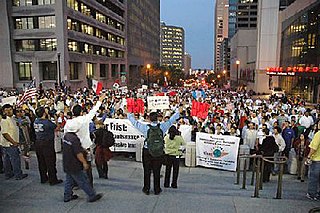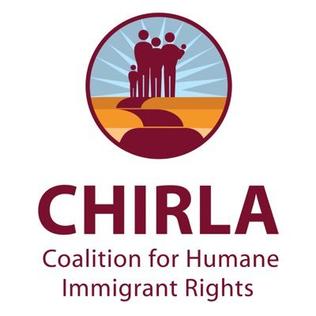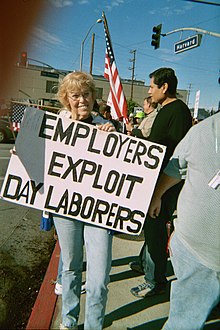CCIR is a four-letter abbreviation that may stand for:

Loretta Lorna Sanchez is an American politician who served in the United States House of Representatives from 1997 to 2017, representing parts of central Orange County, California. A member of the Democratic Party, she was first elected in 1996, when she defeated long-serving Republican U.S. Representative Bob Dornan by fewer than 1,000 votes. During her time in the House of Representatives, Sanchez was a member of the Blue Dog Coalition of moderate-to-conservative Democrats.

California Proposition 187 was a 1994 ballot initiative to establish a state-run citizenship screening system and prohibit illegal immigrants from using non-emergency health care, public education, and other services in the State of California. Voters passed the proposed law at a referendum on November 8, 1994. The law was challenged in a legal suit the day after its passage, and found unconstitutional by a federal district court on November 11. In 1999, Governor Gray Davis halted state appeals of this ruling.

Immigration reduction refers to a government and social policy in the United States that advocates a reduction in the amount of immigration allowed into the country. Steps advocated for reducing the numbers of immigrants include advocating stronger action to prevent illegal entry and illegal migration, and reductions in non-immigrant temporary work visas. Some advocate tightening the requirements for legal immigration requirements to reduce numbers or move the proportions of legal immigrants away from those on family reunification programs to skills-based criteria.
The Minuteman Project is an organization which was founded in the United States in August 2004 by a group of private individuals who sought to extrajudicially monitor the United States–Mexico border's flow of illegal immigrants. Founded by Jim Gilchrist and Chris Simcox, the organization's name is derived from the name of the Minutemen, militiamen who fought in the American Revolution. The Minuteman Project describes itself as "a citizens' Neighborhood Watch on our border", and it has attracted the attention of the media due to its focus on the issue of illegal immigration.
The Border Protection, Anti-terrorism, and Illegal Immigration Control Act of 2005 was a bill in the 109th United States Congress. It was passed by the United States House of Representatives on December 16, 2005, by a vote of 239 to 182, but did not pass the Senate. It was also known as the "Sensenbrenner Bill," for its sponsor in the House of Representatives, Wisconsin Republican Jim Sensenbrenner. The bill was the catalyst for the 2006 U.S. immigration reform protests and was the first piece of legislation passed by a house of Congress in the United States illegal immigration debate. Development and the effect of the bill was featured in "The Senate Speaks", Story 11 in How Democracy Works Now: Twelve Stories a documentary series from filmmaking team Shari Robertson and Michael Camerini.

In 2006–2007, millions of people participated in protests over a proposed change to U.S. immigration policy. These large scale mobilizations are widely seen as a historic turning point in Latino politics, especially Latino immigrant civic participation and political influence, as noted in a range of scholarly publications in this field. The protests began in response to proposed legislation known as H.R. 4437, which would raise penalties for illegal immigration and classify illegal individuals and anyone who helped them enter or remain in the US as felons. As part of the wider immigration debate, most of the protests not only sought a rejection of this bill, but also a comprehensive reform of the country's immigration laws that included a path to citizenship for all illegal immigrants.

The Great American Boycott, also called the Day Without an Immigrant, was a one-day boycott of United States schools and businesses by immigrants in the United States which took place on May 1, 2006.
Illegal immigration, or unauthorized immigration, occurs when foreign nationals, known as aliens, violate US immigration laws by entering the United States unlawfully, or by lawfully entering but then remaining after the expiration of their visas, parole or temporary protected status.
Nativo Lopez-Vigil was an American political leader and immigrant rights activist in Southern California. Lopez was a national president of the Mexican American Political Association and the national director of the Hermandad Mexicana Latinoamericana, a community service and advocacy organization for Mexican and Latin American immigrants throughout the United States.

Scott Randall Baugh is an American attorney and politician. He is a member of the Republican Party. He served in the California State Assembly and served as the chair of the Republican Party in Orange County, California, from the early 2000s to 2015.

A sanctuary city is a municipality that limits or denies its cooperation with the national government in enforcing immigration law.

Jose Luis Correa is an American businessman and politician serving as the U.S. representative for California's 46th congressional district since 2017. His district is based in Orange County and includes the communities of Anaheim and Santa Ana, as well as parts of Orange. A member of the Democratic Party, Correa represented the 34th district in the California State Senate from 2006 to 2014.

The Coalition for Humane Immigrant Rights, also known as CHIRLA, is a Los Angeles county-based organization focusing on immigrant rights. While the organization did evolve from a local level, it is now recognized at a national level. The Coalition for Humane Immigrant Rights of Los Angeles organizes and serves individuals, institutions and coalitions to build power, transform public opinion, and change policies to achieve full human, civil and labor rights. The Coalition for Humane Immigrant Rights of Los Angeles also has aided in passing new laws and policies to benefit the immigrant community regardless of documented status.

Orly Taitz is an Israeli-American political conspiracy theorist and political candidate. A dentist, lawyer, and former real estate agent, Taitz was a figure in the "birther" movement, which promoted the conspiracy theory that Barack Obama was not a natural-born citizen eligible to serve as president of the United States. Taitz also promotes other conspiracy theories both related and unrelated to Obama. Taitz has initiated lawsuits on behalf of the "birther" movement; all were dismissed by the courts, and on one occasion Taitz was ordered to pay $20,000 as a sanction for misconduct in filing frivolous claims. Taitz has unsuccessfully run in statewide elections in California three times.
Founded in 1972, the Asian Law Caucus (ALC) is the United States' first legal aid and civil rights organization serving low-income Asian-Pacific American communities. The ALC focuses housing rights, immigration and immigrant rights, labor and employment issues, student advocacy (ASPIRE), civil rights and hate violence, national security and criminal reform.

Deportation and removal from the United States occurs when the U.S. government orders a person to leave the country. In fiscal year 2014, Immigration and Customs Enforcement conducted 315,943 removals. Criteria for deportations are set out in 8 U.S.C. § 1227.

Executive Order 13768 titled Enhancing Public Safety in the Interior of the United States was signed by U.S. President Donald Trump on January 25, 2017. The order stated that "sanctuary jurisdictions" including sanctuary cities that refused to comply with immigration enforcement measures would not be "eligible to receive Federal grants, except as deemed necessary for law enforcement purposes" by the U.S. Attorney General or Secretary of Homeland Security.
2017 California Senate Bill 54, commonly referred to as "SB 54" and also known as the "California Values Act" is a 2017 California state law that prevents state and local law enforcement agencies from using their resources on behalf of federal immigration enforcement agencies. The law allows for cooperation between local, state and federal law enforcement in cases of violent illegal immigrants, and is often referred to as a "sanctuary law" due to its resemblance of sanctuary jurisdiction policies.
Department of Homeland Security v. Thuraissigiam, 591 U.S. ___ (2020), was a United States Supreme Court case involving whether the Illegal Immigration Reform and Immigrant Responsibility Act of 1996, which limits habeas corpus judicial review of the decisions of immigration officers, violates the Suspension Clause of Article One of the U.S. Constitution. In the 7–2 opinion, the Court ruled that the law does not violate the Suspension Clause.












